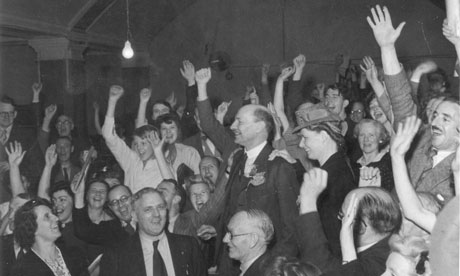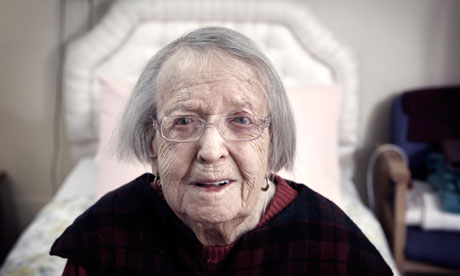The Spirit of ’45 – Film Review
Director: Ken Loach
Released: 15 March 2013
The Spirit of ’45, the latest documentary from Ken Loach, is aptly named, as it presents the ghost of times long past, when a victorious but impoverished post-war society was buoyed by optimism, possibility and a desire for renewal into pulling itself out of crisis – a spirit which Loach implies would be most useful for contemporary Broken Britain.

The film opens on Great Britain at its most triumphant, following the Allied victory in World War II. Yet it is not long before exuberant opening scenes of soldiers reuniting with families and sweethearts give way to the fact that they were also returning home to wartime destruction of buildings, roads and towns; widespread poverty and infectious diseases; and an impending employment crisis. Writer/director Loach illustrates, through engaging use of archive footage as well as contemporary interviews with retirees who lived through the post-war period, how the Labour Party’s nationalization of public transportation, provision of council housing, and implementation of the National Health Service helped to rebuild and stabilize Britain.
Loach makes a convincing, if emotive, case for the Keynesian policies espoused by Labour PM Clement Attlee, which is only to be expected from a long-time socialist filmmaker. The film is presented almost entirely in black and white, the talking heads shot in monochrome to complement the archive material. This may also be to avoid claims of literally looking back at the past with rose-tinted (NHS) frames, but with tales of broken glass bottle bits being traded in for government-issued spectacles, that’s undeniably what Loach is doing here. Yet the interviewees are a delight, recalling the differences that these government policies made in their lives in an affective and very human way that resonates across borders and makes it difficult to call out Loach’s framing as pure Utopianism.

The Spirit of ‘45 takes a straightforward chronological approach to chronicling the social changes in Britain from the 1930’s onward seeking before-and-after perspectives from those who benefited greatly from nationalization and the welfare state, before the tone of the film takes a turn in which the ‘after-Clement Attlee’ perspective cleverly also doubles as the ‘before-Margaret Thatcher’ narrative.
There is some inconsistency and lack of contextualization particularly in this latter half of the film when dealing with coal-mine closure and large-scale privatization of utilities, but anyone familiar with Loach’s previous work will already be aware of his position on these issues. Although he remains off-camera throughout, he cannot be accused of silence, particularly in the appeals to the mostly-privatized Royal Mail and the endangered state of the NHS, which remain on-going concerns.

The film concludes with a late-stage colorization of the opening scenes, a clever move bringing the film full-circle and suggesting a resonance with the current socio-political climate in Britain, highlighting The Spirit of ’45’s status as a fascinating, important, if partisan chronicle of a period of British history proving ever more relevant to its present.
Score: 4/5
Please Join us on your Social Platform of choice